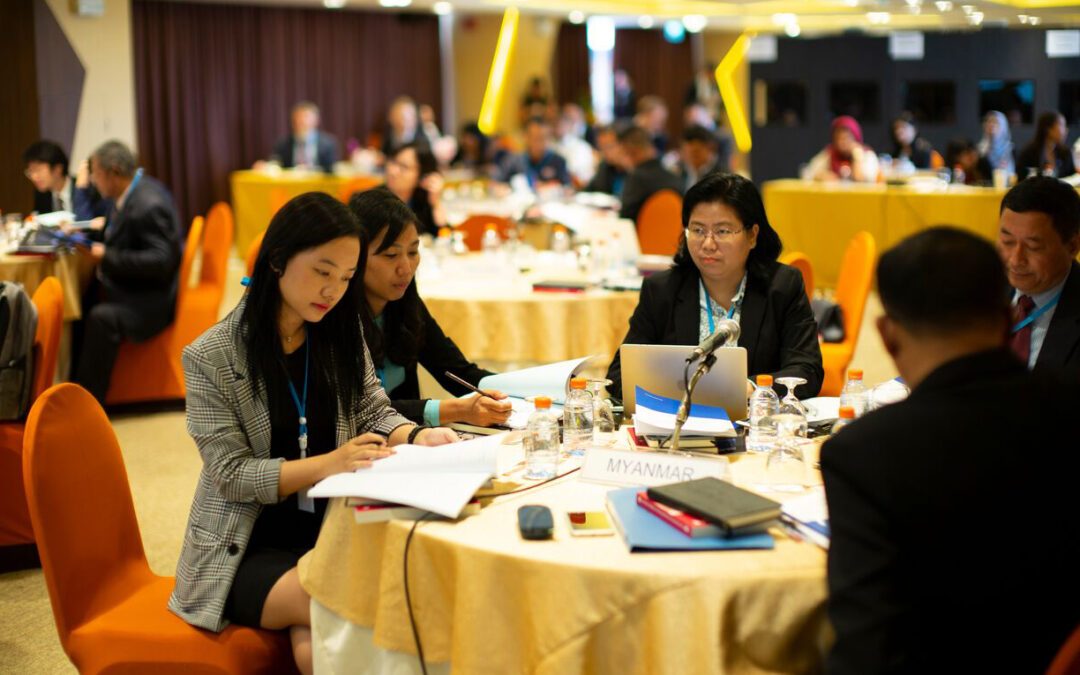
Jun 1, 2018 | Events, News
Between 30 May and 1 June 2018, the ICJ co-hosted a workshop for authorities from Thailand, Cambodia, Myanmar and Nepal on the investigation of potentially unlawful deaths and enforced disappearance in accordance with international human rights law and standards.
The workshop was co-hosted with Thailand’s Ministry of Justice and the United Nations Office of the High Commissioner for Human Rights (OHCHR) and took place as part of the ICJ’s Global Redress and Accountability Initiative, which has as one of its core objectives, “increasing the knowledge and capacity of lawyers, prosecutors and investigators to deal with challenges of impunity and access to redress.”
The participants included more than 30 criminal investigators, forensic doctors, forensic scientists, prosecutors, police trainers, senior judges and representatives of the Cambodian Ministry of Justice, the Myanmar Attorney General’s Office, the Thai Ministry of Justice and the Nepal Office of the Attorney General.
The event commenced with opening remarks by the Ambassador of Finland, Ms. Satu Suikkari-Kleven; the Ambassador of Germany, Mr. Peter Prügel; Adviser on the Promotion of the Rights and Freedom from Thailand’s Ministry of Justice, Mr. Pitaya Jinawat; and the Asia Director of the ICJ, Frederick Rawski.
Alex Conte, Senior Law and Policy Advisor, ICJ Global Redress and Accountability Initiative, gave an overview of the international human rights legal framework that applies to the investigation of unlawful deaths and enforced disappearance.
Kingsley Abbott, Senior Legal Adviser at the ICJ, then provided an overview of the revised Minnesota Protocol on the Investigation of Potentially Unlawful Death (2016), which was launched in Thailand on 25 May 2017 and which formed the core of the materials used at the workshop.
Other speakers included Ms. Jennifer Prestholdt, Deputy Director, the Advocates for Human Rights, who presented on the Rights of Victims and Families and witness interviews; Mr. Glenn Williams, Detective Inspector, Field Crime Manager, New Zealand Police National Headquarters, who presented on the investigation process including crime scene management;
Ms. Shivani Verma and Ms. Pratubjit Neelapaijit, of the Office of the High Commissioner for Human Rights who presented on Witness Protection; and Dr. Pornthip Rojanasunan, Adviser, Central Institute of Forensic Science (CIFS)/Member of the Advisory Panel who presented on forensic pathology.
This workshop followed two workshops the ICJ co-hosted between 5 to 8 December 2017 in Thailand on the investigation of potentially unlawful deaths and enforced disappearance for lawyers from Thailand and India, academics and the Thai authorities.
Contact
Alex Conte, ICJ Global Redress and Accountability Initiative, t: +41 79 957 2733; e: alex.conte(a)icj.org
Kingsley Abbott, Senior International Legal Adviser, ICJ Asia Pacific Regional Office, t: +66 94 470 1345, e: kingsley.abbott(a)icj.org
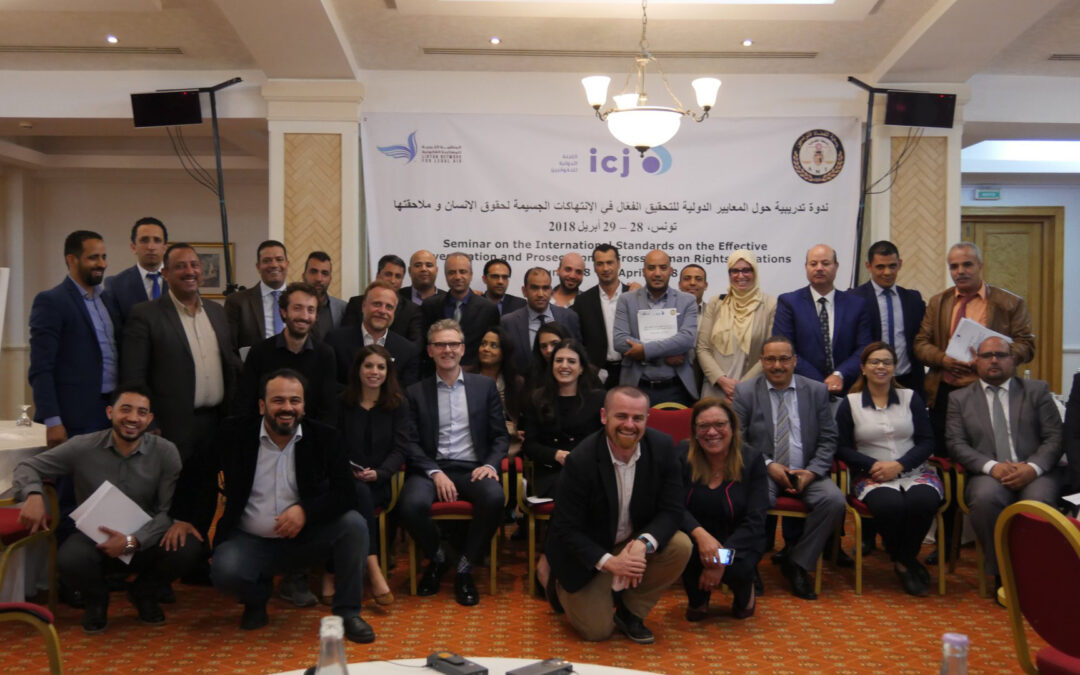
Apr 29, 2018 | News
Between 28 and 29 April 2018, the ICJ co-hosted a Seminar for judges and prosecutors from Tunisia and Libya on the international law and standards that apply to the investigation and prosecution of gross human rights violations.
The participants included more than 30 judges and prosecutors from different regions in Tunisia and Libya.
The Seminar was co-hosted with the Associations des Magistrats Tunisiens (AMT) and the Libyan Network for Legal Aid.
The event commenced with opening remarks by ICJ Commissioner, Justice Kalthoum Kennou of Tunisia.
Kingsley Abbott, Senior Legal Adviser at the ICJ, delivered a comprehensive overview of the international human rights law and standards that apply to the duty to investigate gross human rights violations.
He noted in particular that investigations of potentially unlawful deaths play a key role in accountability by upholding the right to life, which is guaranteed by Article 6 of the International Covenant on Civil and Political Rights.
He then introduced the revised Minnesota Protocol on the Investigation of Potentially Unlawful Death (2016), which sets out a common standard of performance in investigating potentially unlawful deaths or suspected enforced disappearance and a shared set of principles and guidelines for States, as well as for institutions and individuals who play a role in the investigation.
The revised Minnesota Protocol formed part of the core materials referred to at the Seminar, together with the ICJ Practitioners Guide No 9 – Enforced Disappearance and Extrajudicial Execution: Investigation and Sanction (2015).
The Seminar also covered the collection of evidence, the duty to prosecute, and fair trial rights.
Other speakers at the event included Vito Todeschini, Associate Legal Adviser at the ICJ; Aonghus Kelly, Senior Legal Adviser, EU Border Assistance Mission in Libya (EUBAM); and Martin Hackett, Senior Trial Counsel at the Special Tribunal for Lebanon in the Hague.
Contact
Said Benarbia: said.benarbia(a)icj.org
Kingsley Abbott: kingsley.abbott(a)icj.org
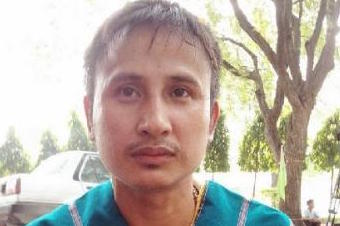
Apr 16, 2018 | News
On the fourth anniversary of the apparent enforced disappearance of Karen activist, “Billy,” the ICJ repeats its calls for the Department of Special Investigations (DSI) to assume responsibility for effectively investigating the case.
To date no progress has been made to establish the fate of Billy and the DSI has declined to take up the matter.
Pholachi “Billy” Rakchongcharoen was last seen on 17 April 2014 in the custody of Kaeng Krachan National Park officials.
At the time of his apparent enforced disappearance, Billy had been working with ethnic Karen villagers and activists on legal proceedings the villagers had filed against the National Park, the Wildlife and Plant Conservation Department, the Ministry of Natural Resources and Environment, and the former Chief of Kaeng Krachan National Park concerning the alleged burning of villagers’ homes and property in the National Park in 2010 and 2011.
“The very reason the DSI was created was to investigate complex cases of this kind, including where Government officials may be implicated in gross human rights violations that amount to crimes under international law,” said Kingsley Abbott, Senior International Legal Adviser with the ICJ.
“If the DSI continues to refuse to open a special investigation after four years of little apparent progress by the police, the DSI will risk being perceived as contributing to the pervasive culture of impunity that exists within Thailand,” he added.
This week, Billy’s wife, Phinnapha Phrueksaphan, advised the ICJ that the last time the DSI had discussed Billy’s investigation with her and her family was over a year ago.
The ICJ was further informed that on 9 April 2018, Phinnapha submitted a letter to the Director-General of the DSI seeking updates on the progress of Billy’s case and clarification as to why the DSI had not accepted Billy’s case for a special investigation.
“Thailand has a clear legal duty to continue to investigate the case until Billy’s fate or whereabouts are established and to ensure that the investigative process and any outcomes are transparent – which is especially important to victims’ families who play a crucial role in investigations,” added Abbott.
On 23 May 2017, Thailand established a Committee consisting of 18 officials, including from the DSI, to formulate policies for the prevention of acts of torture and enforced disappearance, and to investigate and provide remedies in accordance with the Convention against Torture and Other Cruel, Inhuman or Degrading Treatment or Punishment (CAT), to which Thailand is a party, and the International Convention for the Protection of All Persons from Enforced Disappearance (ICPPED), which Thailand has signed but not yet ratified.
On 26 June 2017, the Committee reportedly stated that it would consider past, pending and new cases of enforced disappearance, including the case of Billy.
However, the Committee has yet to demonstrate effectiveness in efforts to implement Thailand’s international human rights obligations.
“While any steps Thailand takes towards accountability for allegations of torture, ill-treatment and enforced disappearance is welcome, the Committee should not be seen as a meaningful substitute for establishing these as crimes under domestic law,” Abbott said.
Thailand-Billy disappearance 4th year-News-web story-2018-ENG (Full story in PDF)
Thailand-Billy fourth-News-webstory-2018-THA (Thai version, in PDF)
Further Reading
Billy’s case
ICJ, ‘Launch special investigation into enforced disappearance of “Billy”’, 6 August 2015
ICJ, ‘Strengthen efforts to solve the apparent enforced disappearance of “Billy”, 16 April 2015
ICJ, ‘“Disappearance” of Billy demands special investigation’, 17 July 2014
ICJ, ‘Thai authorities must urgently investigate Billy’s ‘disappearance’’, 28 April 2014
Draft Act criminalizing torture and enforced disappearance
ICJ and Amnesty International, Open letter to Thailand’s Minister of Justice on the amendments to the Draft Prevention and Suppression of Torture and Enforced Disappearances Act, 12 March 2018
English
Thai
ICJ and Amnesty International, Recommendations to Thailand’s Ministry of Justice on the Draft Prevention and Suppression of Torture and Enforced Disappearances Act, 23 November 2017
Human Rights Committee review of Thailand
ICJ and Thai Lawyers for Human Rights and Cross-Cultural Foundation, Joint follow-up submission to the UN Human Rights Committee, 27 March 2018
UN Committee against Torture review of Thailand
ICJ and Thai Lawyers for Human Rights, Joint submission to the UN Committee against Torture, 29 January 2018
Contact
Kingsley Abbott, ICJ Senior International Legal Adviser, email: kingsley.abbott(a)icj.org
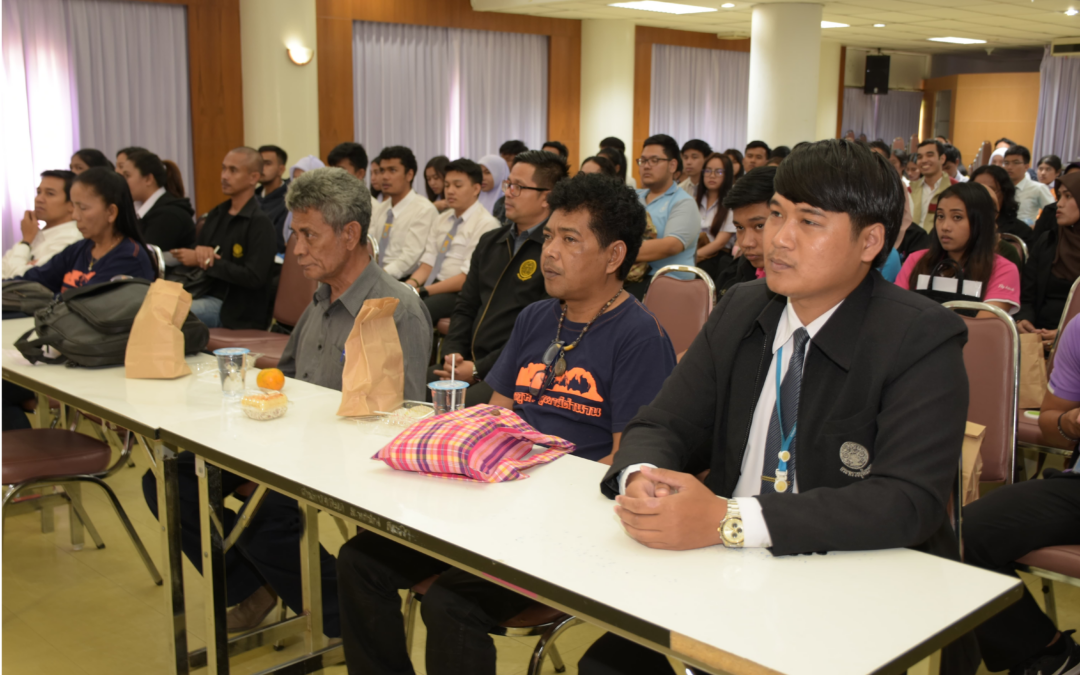
Feb 14, 2018 | News
Today, the ICJ addressed an academic seminar on the topic of “Public interest and the anti-strategic lawsuit against public participation (SLAPP)”.
It was organized by Thaksin University’s Faculty of Law, in collaboration with the Embassy of Canada in Bangkok, the Thai Ministry of Justice’s Justice Office, and the Community Resources Centre Foundation (CRC).
Participants in the seminar, which was held at Thaksin University, included more than 50 undergraduate students and lecturers from Thaksin University, around 20 villagers from affected communities, and approximately 20 justice officers from the Justice Office of Songkhla Province, Ministry of Justice.
Sanhawan Srisod, ICJ National Legal Adviser, delivered an introduction to basic international human rights law on the rights to freedom of expression, association, and peaceful assembly, and Thailand’s international legal obligations in relation to these rights.
Other speakers at the Workshop were Ms. Jantima Thanasawangkul, Special Prosecutor, Department of Legal Aid and Civil Rights Protection, Office of the Attorney General; Ms. Sor.Rattanamanee Polkla, Lawyer, Community Resources Centre Foundation; and Mr. Tawan Puakpong, Justice Office of Songkhla Province, Ministry of Justice.
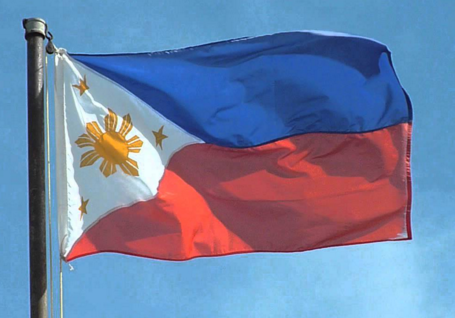
Jan 18, 2018 | News
The ICJ today expressed concern about the impacts on freedom of expression of a decision by the Securities and Exchange Commission (SEC) that would shut down Rappler, an online news source in the Philippines.
On 11 January, after a year-long investigation, the SEC of the Philippines revoked the Certificate of Incorporation of Rappler, Inc.
The ICJ is concerned that the decision to target Rappler may have been retaliatory and politically motivated.
The investigation was initiated by a letter transmitted by the Solicitor General to the SEC requesting the latter to investigate allegations of foreign ownership of Rappler, Inc.
“The cancellation of the Certificate of Incorporation of Rappler, Inc. constitutes a significant restriction on freedom of expression,” said Emerlynne Gil, ICJ’s Senior International Legal Adviser.
“The Courts must give rigorous scrutiny both to the specific basis the authorities offer for the decision concerning Rappler, Inc., and the scope and application of the foreign equity provision more generally, including an inquiry whether the law is being applied in a proportionate and non-discriminatory manner,” she added.
If such restrictions on freedom of expression are enforced with the actual aim of punishing or preventing critical political expression, or are enforced only against some political or other opinions and not others, this would violate the rights to freedom of expression and non-discrimination under the Philippine Constitution and international human rights law, the ICJ adds.
Further, under international human rights law any restriction on freedom of expression must be limited to what is necessary and proportionate both in relation to the legitimate aim it pursues and in relation to its impacts.
For instance, it would not be consistent with international human rights law to prohibit all foreign ownership of mass media or mass-media-owning entities, unless the government was able to demonstrate that the same legitimate aim could not reasonably be achieved by prohibiting only majority foreign ownership.
Contact
Emerlynne Gil, ICJ Senior International Legal Adviser for Southeast Asia, t: +662 619 8477 (ext. 206) ; e: emerlynne.gil@icj.org
Philippines-Rappler-News-Web stories-2018-ENG (Full text in PDF)









